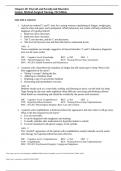-
1. Other - Mn552 advanced health assessmen unit 4: comprehensive soap note and genogram comprehe...
-
2. Exam (elaborations) - Chapter 49: thyroid and parathyroid disorderslinton: medical-surgical nursing, 7th ed...
-
3. Exam (elaborations) - Chapter 47: assessment of endocrine system lewis: medical-surgical nursing, 10th edit...
-
4. Exam (elaborations) - Chapter 45: fractures linton: medical-surgical nursing, 7th edition
-
5. Exam (elaborations) - Chapter 48: pituitary and adrenal disorders linton: medical-surgical nursing, 7th edi...
-
6. Exam (elaborations) - Test bank for medical surgical nursing 7th edition chapter 37: corticosteroidsclayton...
-
7. Exam (elaborations) - Test bank for medical surgical nursing 7th edition chapter 40: drugs used in men's an...
-
8. Exam (elaborations) - Chapter 44: drugs used to treat the musculoskeletal system clayton/willihnganz: basic...
-
9. Exam (elaborations) - Chapter 23: drugs used to treat dysrhythmias clayton/willihnganz: basic pharmacology ...
-
10. Exam (elaborations) - Chapter 41: drugs used to treat disorders of the urinary system clayton/willihnganz: ...
-
11. Exam (elaborations) - Chapter 43: drugs used to treat cancer clayton/willihnganz: basic pharmacology for nu...
-
12. Exam (elaborations) - Chapter 36: drugs used to treat thyroid disease clayton/willihnganz: basic pharmacolo...
-
13. Exam (elaborations) - Chapter 35: drugs used to treat diabetes mellitus clayton/willihnganz: basic pharmaco...
-
14. Exam (elaborations) - Chapter 34: drugs used to treat constipation and diarrhea clayton/willihnganz: basic ...
-
15. Exam (elaborations) - Chapter 28: drugs used for diuresis clayton/willihnganz: basic pharmacology for nurse...
-
16. Exam (elaborations) - Chapter 22: drugs used to treat hypertension clayton/willihnganz: basic pharmacology ...
-
17. Exam (elaborations) - Chapter 32: drugs used to treat gastroesophageal reflux and peptic ulcer disease clay...
-
18. Exam (elaborations) - Chapter 25: drugs used to treat peripheral vascular disease clayton/willihnganz: basi...
-
19. Exam (elaborations) - Chapter 27: drugs used to treat heart failure clayton/willihnganz: basic pharmacology...
-
20. Exam (elaborations) - Chapter 20: introduction to cardiovascular disease and metabolic syndrome clayton/wil...
-
21. Exam (elaborations) - Chapter 15: drugs used for anxiety disordersclayton/willihnganz: basic pharmacology f...
-
22. Exam (elaborations) - Chapter 16: drugs used for depressive and bipolar disorders clayton/willihnganz: basi...
-
23. Exam (elaborations) - Chapter 17: drugs used for psychoses clayton/willihnganz: basic pharmacology for nurs...
-
24. Exam (elaborations) - Medical-surgical nursing 7th edition linton test bankchapter 12: immobilitylinton: me...
-
25. Exam (elaborations) - Chapter 13: delirium and dementialinton: medical-surgical nursing, 7th edition questi...
-
26. Exam (elaborations) - Chapter 11: falls linton: medical-surgical nursing, 7th edition questions with 100% c...
-
27. Exam (elaborations) - Chapter 10: the older adult patient linton: medical-surgical nursing, 7th edition
-
28. Exam (elaborations) - Chapter 08: pain linton: medical-surgical nursing, 7th edition questions with 100% co...
-
29. Exam (elaborations) - Chapter 17: surgerylinton: medical-surgical nursing, 7th edition questions with 100%...
-
30. Exam (elaborations) - Chapter 05: immunity, inflammation, and infection linton: medical-surgical nursing, 7...
-
31. Exam (elaborations) - Chapter 07: the patient with cancer linton: medical-surgical nursing, 7th edition qu...
-
32. Exam (elaborations) - Chapter 04: health, illness, stress, and coping linton: medical-surgical nursing, 7th...
-
33. Exam (elaborations) - Chapter 03: medical-surgical patients: individuals, families, and communities linton:...
-
34. Exam (elaborations) - Chapter 02: medical-surgical practice settings linton: medical-surgical nursing, 7th ...
-
35. Exam (elaborations) - Chapter 01: aspects of medical-surgical nursing linton: medical-surgical nursing, 7th...
-
36. Exam (elaborations) - Chapter 60: ear and hearing disorderslinton: medical-surgical nursing, 7th edition 10...
-
37. Exam (elaborations) - Chapter 59: eye and vision disorders linton: medical-surgical nursing, 7th edition
-
38. Exam (elaborations) - Test_bank_for_medical_surgical_nursing_7th_edition_by_linton__2 question and answers ...
-
Show more




